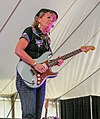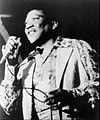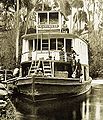Portal:Blues
The Blues Portal

Blues is a music genre and musical form that originated amongst African-Americans in the Deep South of the United States around the 1860s. Blues incorporated spirituals, work songs, field hollers, shouts, chants, and rhymed simple narrative ballads from the African-American culture. The blues form is ubiquitous in jazz, rhythm and blues, and rock and roll, and is characterized by the call-and-response pattern, the blues scale, and specific chord progressions, of which the twelve-bar blues is the most common. Blue notes (or "worried notes"), usually thirds, fifths or sevenths flattened in pitch, are also an essential part of the sound. Blues shuffles or walking bass reinforce the trance-like rhythm and form a repetitive effect known as the groove.
"The Blues" is characterized by its lyrics, bass lines, and instrumentation. Early traditional blues verses consisted of a single line repeated four times. It was only in the first decades of the 20th century that the most common current structure became standard: the AAB pattern, consisting of a line sung over the four first bars, its repetition over the next four, and then a longer concluding line over the last bars. Early blues frequently took the form of a loose narrative, often relating the racial discrimination and other challenges experienced by African-Americans.
Many elements, such as the call-and-response format and the use of blue notes, can be traced back to the music of Africa. The origins of the blues are also closely related to the religious music of the Afro-American community, the spirituals. The first appearance of the blues is often dated to after the ending of slavery, with the development of juke joints occurring later. It is associated with the newly acquired freedom of the former slaves. Chroniclers began to report about blues music at the dawn of the 20th century. The first publication of blues sheet music was in 1908. Blues has since evolved from unaccompanied vocal music and oral traditions of slaves into a wide variety of styles and subgenres. Blues subgenres include country blues, Delta blues and Piedmont blues, as well as urban blues styles such as Chicago blues and West Coast blues. World War II marked the transition from acoustic to electric blues and the progressive opening of blues music to a wider audience, especially white listeners. In the 1960s and 1970s, a hybrid form called blues rock developed, which blended blues styles with rock music. (Full article...)
Selected article -
Live in Cook County Jail is a 1971 live album by American blues musician B.B. King, recorded on September 10, 1970, in Cook County Jail in Chicago. Agreeing to a request by jail warden Winston Moore, King and his band performed for an audience of 2,117 prisoners, most of whom were young black men. King's set list consisted mostly of slow blues songs, which had been hits earlier in his career. When King told ABC Records about the upcoming performance, he was advised to bring along press and recording equipment.
Live in Cook County Jail spent thirty-three weeks on the Billboard Top LPs chart, where it peaked at number twenty-five. It also reached number one on the Top R&B chart, King's only album to do so. In addition to positive reviews from critics, much of the press surrounding Live in Cook County Jail focused on the harsh living conditions in the prison, which led to an eventual reform. (Full article...)Selected picture
Quotes
| “ | Blues is really America's finest art form and most dominant art form of the 20th century. | ” |
| — Georgie Fame | ||
| “ | Blues is a natural fact, something that a fellow lives. If you don't live it, you don't have it. | ” |
| — Big Bill Broonzy | ||
| “ | The blues is a low-down achin' heart disease Like consumption killing me by degrees. |
” |
| — Robert Johnson, "Preaching Blues (Up Jumped the Devil)" | ||
| “ | When you lay down at night, turning from one side of the bed to the other and can't sleep, what's the matter? Blues got you. | ” |
| — Lead Belly | ||
| “ | The blues had a baby and they named it rock and roll. | ” |
| — Muddy Waters | ||
Selected biography -
Chester Arthur Burnett (June 10, 1910 – January 10, 1976), better known by his stage name Howlin' Wolf, was an American blues singer and guitarist. He was at the forefront of transforming acoustic Delta blues into electric Chicago blues, and over a four-decade career, recorded blues, rhythm and blues, rock and roll, and psychedelic rock. He is regarded as one of the most influential blues musicians of all time.
Born into poverty in Mississippi as one of six children, he went through a rough childhood where his mother kicked him out of her house, and he moved in with his great-uncle, who was particularly abusive. He then ran away to his father's house where he finally found a happy family, and in the early 1930s became a protégé of legendary Delta blues guitarist and singer Charley Patton. He started a solo career in the Deep South, playing with other notable blues musicians of the era, and at the end of a decade had made a name for himself in the Mississippi Delta. (Full article...)General images -
Things to do
Tasks template
 |
Here are some tasks awaiting attention:
|
- –When a task is completed, please remove it from the list.
WikiProjects
Categories
Related portals
Wikimedia
The following Wikimedia Foundation sister projects provide more on this subject:
-
Commons
Free media repository -
Wikibooks
Free textbooks and manuals -
Wikidata
Free knowledge base -
Wikinews
Free-content news -
Wikiquote
Collection of quotations -
Wikisource
Free-content library -
Wikispecies
Directory of species -
Wikiversity
Free learning tools -
Wikivoyage
Free travel guide -
Wiktionary
Dictionary and thesaurus






































































































